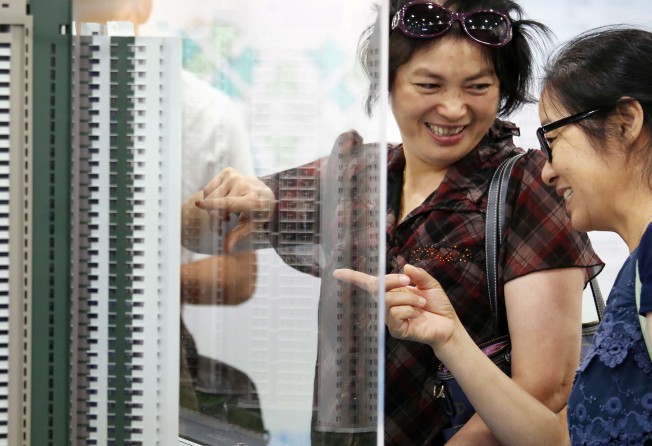Will it or won’t it? Fed expected to delay interest rate hike until the end of the year – but some believe it will be this month
December, or March next year, touted as the time when Hong Kong homeowners will brace for further downward pressure on residential prices

The initial reaction to last Friday’s tepid United States jobs figure was that the Federal Reserve would hold off an interest rate hike until the end of this year, or next March.
However, there are investors who feel the labour market points to an upswing in the US economy. The Wall Street Journal reported that Goldman Sachs had increased its odds of an interest rate hike this month to 55 per cent from 40 per cent.
So will the Sword of Damocles fall on Hong Kong’s homeowners, who have been used to almost a decade of ultralow interest rates, when the Federal Reserve meets this month?
According to figures released on September 2, US employers did just enough hiring in August to keep unemployment in check and maintain steady wage growth. But the cooling jobs growth from recent months reinforced market expectations that the Fed will put off a rate increase until December at the earliest.
The monthly gain of 151,000 jobs was neither strong enough nor weak enough to settle the central bank’s long-running problem whether the American economy can withstand another rate hike.
Since the Hong Kong dollar is pegged to the greenback, local banks follow the US interest rate cycle – although the city’s banks did not follow suit when the Fed raised the rate last December.
Richard Jerram, chief economist at Bank of Singapore, says the latest US jobs report was “not so hot that it makes a September rate hike a strong possibility, but not so cold that a move by the Fed is unthinkable”.
He adds that the excessive caution shown by the Fed over the past few years suggests that it is likely to err on the side of caution. “A September move is possible [maybe a 30 per cent chance], but we see a December hike as more likely [80 per cent chance of a move by year’s end],” Jerram says.
Fan Cheuk-wan, head of investment strategy, Asia at HSBC Private Bank, says the bank’s view is that the Fed will not raise interest rates until June 2017. She says that the Fed would remain cautious due to weaker than expected job gains and ISM readings in August .
“Apart from the domestic [US] factors, the Fed is concerned about global market risk and US dollar strength,” Fan says, adding that Hong Kong’s economy “is still in a slow-growth path ... and it would reflect on the property market”. Looking overseas, Fan says that Japan has dipped back into deflation”, meaning that the Fed would remain cautious about raising rates. Fed officials say they will continue “to closely monitor inflation indicators and global economic and financial developments”.
Fed officials say they will continue “to closely monitor inflation indicators and global economic and financial developments”.
Strategists say that a rate hike in December could weaken the fragile property market in Hong Kong.
A recent report by Colliers International showed that with ultralow interest rates persisting and the pace of increases likely to be slow, Hong Kong’s residential property market had stabilised in the second quarter despite growing economic worries over Brexit – Britain’s decision to leave the European Union.
“We expect home prices to slide 10 -15 per cent in 2016. Given the severely stretched affordability, we think local home prices would experience a soft landing, which could fall by 30 per cent or more over the next three years,” the Colliers report says.
David Ji, director and head of research at Knight Frank, says that a small rise in interest rates would not have much of an impact on homeowners. He says that it would be more of a “psychological impact” as the market has already priced in a 25 basis point rise.
However, if the interest rates are increased by more than 200 basis points, this will start to affect repayment ability, and property prices would face downward pressure. “We believe Hong Kong’s residential property prices will be under downward pressure for the coming two to three years, but the percentage should not be too dramatic, as the end-user demand remains.”
Fan says that the property sector will stay in consolidation mode in the second half of this year. She says the bank’s economists expect Hong Kong’s GDP to grow at around 1.5 per cent this year and 2 per cent next year. “The property market will continue to face headwinds in a slowing economy,” Fan says. “Property prices will continue to trend downwards.”
Looking at Hong Kong’s economic prospects for the year, a report by the Rating and Valuation Department says that the global economy in 2016 is rather uncertain. The pace of expansion of the mainland economy may also be slow. The local economy and property market, which are clouded by the implementation of “one trip per week” Individual Visit Endorsements; the interest-rate hike in the US interest at the end of 2015; and volatility of local stock market will inevitably put more pressure on Hong Kong’s prospects.
The department says that the government will remain vigilant, and continue to closely monitor property market movements and ever-changing external conditions, with reference to a series of indicators, including property prices, home purchase affordability ratio, transaction volumes, flat supply and local and global economic development.